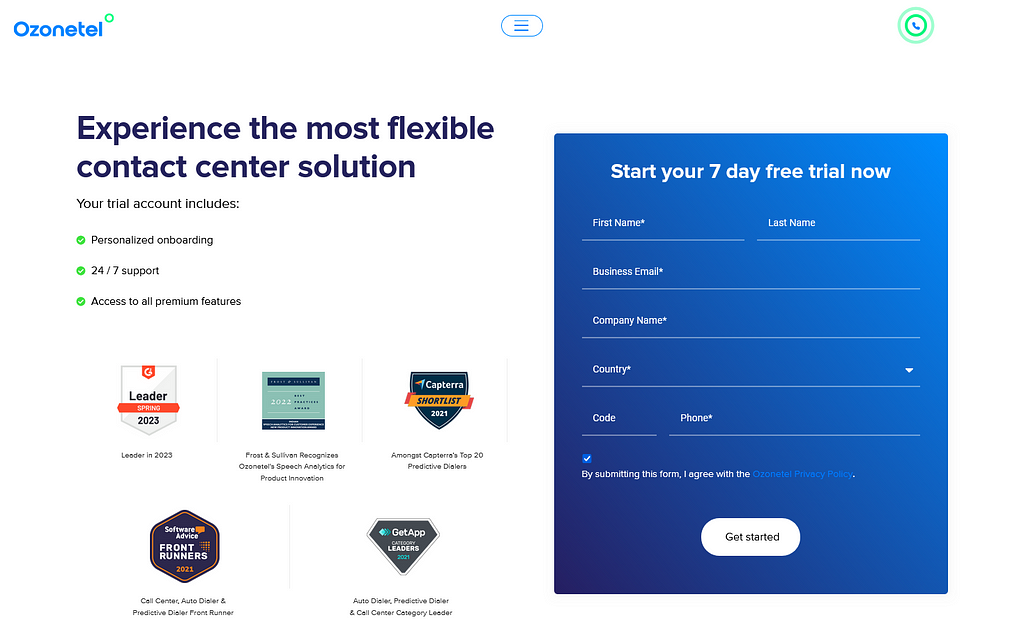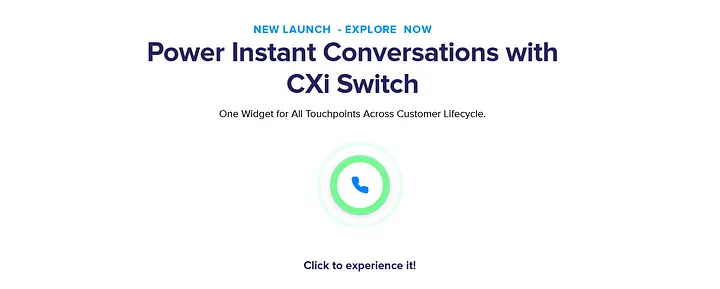- Resources
- What is CPaaS? How Does It Help Businesses Provide Better Customer Experiences?
What is CPaaS? How Does It Help Businesses Provide Better Customer Experiences?

Did you know?
- 86% of customers are willing to pay more for a better customer experience.
- 76% of customers expect companies to understand their needs and expectations.
- 75% of customers are more likely to buy from a company that knows their name and purchase history
To deliver superior experiences, you need to prioritize personalized communication that resonates with your customers.
And here, CPaaS, aka Communications Platform as a Service, comes in.
With CPaaS solutions, you can fully customize your communications stack. Instead of purchasing solutions with predefined features or building a solution from scratch, you can integrate selected communication features into the business apps you use.
Additionally, the cloud-based delivery model minimizes investments while ensuring easy scalability. Elevate your customer interactions by tailoring communication to their preferen
What is CPaaS?
CPaaS (Communications Platform as a Service) is a cloud-based platform that businesses use to embed real-time communications features like voice calls, in-app messaging, WhatsApp messages, interactive voice response, email, and SMS communication into their existing workflows and applications— enabling faster turnaround time and agile innovation.
This communications platform allows developers and IT teams to leverage their web development skills to build telecom applications. The platform acts as an interface between business applications and the user’s landline, feature phone, or smartphone.
With a CPaaS solution, your business does not require to own infrastructure or build communication features from scratch. Instead, with the help of Communication APIs (Application Program Interfaces), all you have to do is pick your preferred communication features and integrate them with the existing software stack.
How Does CPaaS Work?
CPaaS provides companies with easy integration of advanced features such as audio/video calling, SMS messaging, voice recognition, and identity management. CPaaS solutions typically integrate with existing software and hardware such as customer relationship management (CRM) systems, mobile apps, and web portals. With CPaaS, businesses no longer need to build custom communications solutions from scratch – they can offload the job to a cloud-based service that takes care of all the details.
CPaaS solutions are becoming increasingly popular in enterprise settings, as they offer businesses greater control over their communications environment. Companies can use CPaaS for customer support, sales automation, collaboration, and more. With the introduction of 5G networks and edge computing, CPaaS solutions are now able to provide even faster service in remote locations.
CPaaS Advantages: Transforming Business Operations for Maximum Benefits
CPaaS empowers IT heads and developers with a robust platform where they can easily build communication capabilities into their existing software or applications for seamless connectivity. Let’s take a look at its benefits.
Rapid innovation
Businesses often have ideas for out-of-the-box solutions to improve customer experience (CX) on their mobile applications or websites. However, video, voice, and SMS are each single-purpose applications each having its code and logic. As a result, integrating and syncing them on the backend with communication channels is an enormous challenge for developers.
CPaaS platforms simplify telecom and digital communications for businesses enabling them to innovate more rapidly while saving costs and time.
Seamless integrations
Using CPaaS solutions, your developers can authorize webhooks to send an SMS, place a call, or send an alert from within existing business applications such as their CRM, based on predefined criteria—in a matter of minutes.
Most CPaaS providers offer readymade integrations with leading CRM solutions on one end and with messaging channels such as WhatsApp, or social media channels such as Twitter and Facebook on the other end. Your CPaaS solution will also integrate with any of your custom applications.
Omnichannel experiences
Today’s customer contacts a business through multiple touchpoints. For instance, they could buy a product at your offline store, make a complaint about it via email, follow up on that complaint via a phone call and then make a repurchase on your online store.
When they contact your customer service, they expect the agent to already have details of their prior communications. Similarly, when your business gets in touch with the customer via, let’s say a WhatsApp message, they expect the offer you send to be personalized for them. This is only possible when there is a seamless integration between your various customer-facing channels and the backend data.
Custom applications
CPaaS offers your business the tools for a rapidly changing communications environment and reacting faster to unpredictable situations. Compared to UCaaS and CCaaS solutions, you don’t get a pre-bundled set of features but instead can quickly add the exact features your business requires at that point. You only pay for what you use and can scale up or add new features on the fly as your business requirements grow or change. CPaaS offers a rapid means of building your own business applications on a robust communications platform.
Cost savings
Developing a solution from scratch can significantly drain resources and time. A lot of time goes into writing custom code and managing disconnected applications. This process can become inefficient, cost-ineffective, and unsustainable over the long term, while solutions like CPaaS prove cost-effective and efficient.
CPaaS providers bill on a pay-per-use basis, which is far cheaper than building and hosting your own communications infrastructure.
Data privacy
Your CPaaS platform will not store any of your data or access any details of your application. The Application Programming Interface will also provide a layer of security for both your application data and the server by sharing only relevant data between the two.
Dependability
A trustworthy CPaaS vendor ensures a high availability infrastructure with in-built redundancies and high uptime giving you unmatched business continuity without any maintenance hassles. They will also ensure meet the latest regulations and compliances you require in every region.
Flexibility
CPaaS is incredibly flexible. Businesses can customize their communications solutions to meet the specific needs of their users, while still benefitting from all the advanced features offered by the platform. This is great from a scalability standpoint, as companies can quickly launch new features and services without having to build them from scratch.
Convenience
CPaaS solutions provide businesses with a single, unified platform for managing their communications. This makes it easy to add and manage users, access analytics, and take advantage of real-time insights. Plus, the user experience is enhanced across multiple channels with features such as IVR, chatbots, and more.
CCaaS vs CPaas vs UCaaS
CPaaS is an ultra-flexible solution to the modern challenge of running a call center. It combines the very best of communication systems today while delivering benefits that other options can’t offer. See a breakdown of how CPaaS compares to other call center solutions below.| Service Type | Features/Characteristics |
|---|---|
| CCaaS (Contact Center as a Service) |
External communication solutions for contact centers Pre-bundled cloud communication package Facilitates management and supervision |
| UCaaS (Unified Communications as a Service) |
Focuses on internal business communications and collaboration Offers video conferencing tools for remote meetings Supports team messaging apps |
| CPaaS (Communications Platform as a Service) |
Allows you to pick and choose the communications tools that your business requires Works for both customer-facing and employee-facing communications Can automate phone calls and text messages to your customers Supports voice calling and SMS |
What are CPaaS’ Functions?
CPaaS offers a variety of features, each of which can help businesses improve their operations and customer experience.
These include:
Voice Calling and Conferencing – CPaaS solutions allow businesses to quickly add voice calling capabilities into their existing applications, eliminating the need to purchase or maintain separate hardware.
Push Notifications – CPaaS software enables teams to send timely and automated messages to users throughout the customer journey.
SMS, WhatsApp and Chatbot Messaging – CPaaS solutions give companies an easy way of integrating SMS, chatbot and WhatsApp messaging into their applications.
Video Conferencing and WebRTC – CPaaS solutions can enable real-time video conferencing and audio streaming, allowing businesses to connect with customers, prospects, and partners from anywhere in the world. Ozonetel’s click-to-call software enables agents to connect with customers seamlessly, eliminating the need to toggle between windows
Use Cases and Examples of CPaaS
At Ozonetel, we have the privilege of seeing countless CPaaS success stories first-hand. It’s taught us that there are not only many benefits to be reaped by implementing this technology, but plenty of valuable use cases for it as well.
What we do know is that the market is set to expand rapidly over the coming years. Renowned research firm Gartner predicts roughly 90% of businesses will leverage CPaaS tools by 2026, a jump of 30% from 2022. Meanwhile, a study by Frost and Sullivan states that over two-thirds (67%) of business leaders plan to increase their level of investment in the technology over the coming years.
Read below to learn more about the various functions of CPaaS and how it can be applied in business:
Marketing
Brands and marketing agencies have used our CPaaS platform for many innovative marketing campaigns such as missed call campaigns, SMS text campaigns, WhatsApp Campaigns and interactive voice response campaigns that would play pre-recorded music and interactive content.
CPaaS helps easily build contact databases and manage marketing campaigns more efficiently. It’s particularly useful for running lead-generation campaigns that reach contacts on multiple channels of communication.
Also Read: How Muthoot Gold Deployed A Bold Zero-inventory Model to Engage 5 Million Customers
Customer Service
The days of needing a full call center to handle customer inquiries are behind us thanks to CPaaS. This technology enables organizations of any size to provide customer service that’s personalized and highly efficient at scale. From automating outbound voice calls and prioritizing incoming calls based on customer segmentation to intelligent call routing and self-service IVR solutions, CPaaS’ wide breadth of possibilities can make handling customer service calls much easier and more cost-effective.
Also Read: How Ozonetel Helped BigBasket Reduce Wait Times to Less than 10 Sec
Operations
Last-mile delivery, field force management, and real estate firms leverage CPaaS to make sense of the mess of inbound calls they receive every day. CPaaS helps to prioritize, manage, and track calls from customers who may require assistance for anything from a last-minute delivery query to tracking the status of an order. Similarly, field force management firms use it to quickly dispatch workers for service tasks and to track their progress.
Also Read: How Ozonetel’s Call Automation Helped Dr Lal PathLabs Manage the Surge in Post-Pandemic Call Volumes
Trends Shaping the CPaaS Market Today
Although it may be a relatively new solution compared to many of the legacy phone systems businesses use today, CPaaS is already evolving in many ways. The best reason experts can think of as to why is the trend of digital transformation in business. With more companies opting to use cloud-based systems and solutions than ever, CPaaS has become a competitive necessity for organizations with robust call center operations to run.
Let’s take a deeper dive into the trends driving CPaaS’ unprecedented growth:
Conversational AI
A little over a year out from ChatGPT’s viral release and one thing’s for certain – Artificial Intelligence (AI) isn’t going anywhere. It’s mainstream now, and its potential to revolutionize the customer experience is being harnessed in a big way. AI-based chatbots are becoming increasingly popular for customer service functions such as answering FAQs or guiding customers through product selection.
Recent investments in language models will certainly help fuel CPaaS’ growth in the conversational AI space. For instance, Google recently unveiled its ‘BART’ language model which is set to revolutionize the way we ask machines questions.
Omnichannel Connections
Just like how people want quick responses from businesses, they also expect the ability to connect with them via multiple channels. This ability to transition between different communication mediums is at the heart of omnichannel connections.
CPaaS platforms are key for enabling businesses to facilitate these connections. APIs, widgets, and SDKs can be used to develop and deploy omnichannel communication experiences for customers in an efficient manner. This is particularly beneficial when it comes time to engage with customers on mobile.
Analytics and Insights
Data is the driving force behind today’s customer service initiatives – and CPaaS platforms are leading the charge in this regard. Using Machine Learning (ML) capabilities, companies can gain deep insights into customer behavior and preferences on a much larger scale. These insights can then be used to create more tailored customer experiences that boost ever-so-essential engagement and loyalty.
Real-time Interactivity
We live in an increasingly real-time world and customers expect quick responses – everything’s a tap, swipe, or click away.
That’s why newer CPaaS solutions are focusing on improved real-time interactivity through features such as enriched messaging, presence detection, and more. This allows companies to be more proactive in engaging with customers. For example, businesses can now send targeted messages based on customer behavior, location, or demographics to improve customer engagement.
In Conclusion
Technology’s ever-advancing state has also been an important factor in improving CPaaS solutions; with new ways to get and interpret customer data, the possibilities for automating processes to deliver an enhanced customer experience are nearly endless.
Trust Ozonetel, a leader in CPaaS, to provide intelligent customer engagement solutions that will help you meet rising customer expectations while controlling operational costs. Get on board the CPaaS revolution today and experience the power of smarter communication!
Ready to take control of your call transfer
experience for better CX outcomes?
Prashanth Kancherla
Chief Operating Officer, Ozonetel Communications
Over the past decade, Prashanth has worked with 3000+ customer experience and contact center leaders...
Chief Operating Officer, Ozonetel Communications
Over the past decade, Prashanth has worked with 3000+ customer experience and contact center leaders to comprehensively understand the need for effective and efficient customer communications at every step of their journey with a brand. Deeply embedded in today’s CCaaS ecosystem, he has been instrumental in Ozonetel's growth and contributed in various roles including product management, sales, and solution architecture.
Frequently Asked Questions
CPaaS (Communications Platform as a Service) is a cloud-based platform that enables empowers businesses to integrate real-time communication features, like voice and messaging, into their applications without the need for complex infrastructure. CPaaS providers offer a wide range of tools that enable developers to create and manage voice and text messaging without worrying about the underlying infrastructure .
A CPaaS provider is a company that offers a cloud-based platform that enables businesses to integrate communication capabilities directly into their applications. They facilitate voice, video, and messaging services, empowering companies to enhance their customer interactions through tailored communication solutions.
Ozonetel CPaaS solution enables businesses to fully customize their communications stack by integrating selected communication features into the business apps they use. Additionally, the cloud-based delivery model minimizes investments while ensuring easy scalability. O With robust APIs, it allows businesses to customize communication experiences, ensuring seamless integration and efficient customer engagement, making it a top choice in the CPaaS landscape.
CPaaS (Communications Platform as a Service) is a platform that enables businesses to integrate communication capabilities directly into their applications. SaaS (Software as a Service), on the other hand, is a cloud-based computing service that allows businesses and end-users to access software applications over the internet. While SaaS is software, CPaaS is a platform. While SaaS offers comprehensive software solutions, CPaaS specializes in communication features integration.
Apart from Ozonetel’s CPaaS platform, some popular CPaaS alternatives include Bandwidth, Plivo, Twilio, and Vonage Communications APIs (formerly Nexmo). These providers offer a wide range of tools that enable developers to create and manage voice and text messaging without worrying about the underlying infrastructure.







